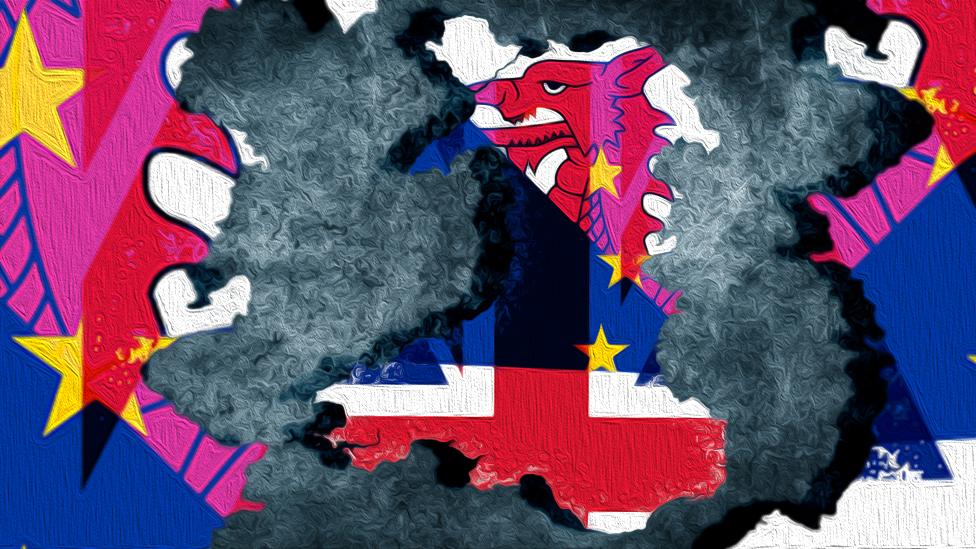EU referendum: The changing political landscape of Wales
- Published

The question on the ballot paper was simple. The message that came back was clear. But the questions in the aftermath of the campaign are many and varied.
Why unlike Scotland or Northern Ireland did Wales back a Brexit from the EU?
And what does the political landscape of Wales look like now?
BBC Wales News' Ceri Jackson went in search of some answers from Professor Laura McAllister, external - politics specialist and former Wales international footballer - as she boarded the Eurostar to watch Wales compete in Euro 2016.

Scotland and Northern Ireland voted to remain. Why didn't Wales? And why did the former Labour heartlands - some of the poorest areas of Europe which have benefited from billions of pounds worth of EU structural funding - vote to leave?
I don't think this was a huge shock in many respects as we've seen the disparity in 'remain' and 'leave' between the nations of the UK for quite some time now. In every poll, Wales has been much closer to the England figures than Scotland or Northern Ireland has. There's been huge movement in Wales away from remaining in the EU - from as little as a year ago the remain side had a lead of between 14 and 18 percentage points. And that's been completely annihilated in the course of one year which tells you something about changes in our political orientation and the way the campaign has played out.
It's significant in that it tells us a lot about the nature of the campaign and also illuminates some of the things I'm going to say later about the political parties, but I think you've got to be quite careful that you don't treat Northern Ireland and Scotland exactly the same in this context.

I think there were strong political and social reasons in Scotland. In Northern Ireland there were economic reasons. It, like Wales, has been a great beneficiary of EU structural funding. The arguments were put very powerfully by Northern Ireland politicians who were in favour of remaining. Their message was that this would be hugely detrimental to the Northern Irish economy. There were attempts to do the same in Wales but clearly these arguments did not land in Wales.
I don't think we had any credible, powerful or cohesive messages of that kind. Equally I think the money from Europe has been better spent in Northern Ireland than it has in Wales. We've seen a plethora of EU funded schemes but for most ordinary people, it's hardly touched them, and the impact has been very small in terms of job creation and tangible news jobs. So that's the main reason I think.

Is the traditional voter now a thing of the past?
The concept of a traditional Welsh voter... I don't think anywhere in the UK you can talk about a die-hard loyal voters anymore. I think that simple equation of that if you are from this particular background with a certain level of education in this geographical area, then you will vote for this party has been completely and utterly destroyed.
That's not just emerged in the EU referendum but probably dates back to the end of the Blair governments And I think the reason for that is the complete chasm between voters and the political elite. In fact this is definitely part of a global phenomenon - Trump in America and Syriza in Greece, to the far-right movements in Austria that we've seen recently. There is a complete divide between people, the masses, and the people who represent them.
And so I don't believe there's this natural bond between any particularly voter and any political party. I think everything is now up for grabs.

So how does the political landscape now look in Wales? Are we witnessing a recalibrating of Welsh politics?
I think we just don't know. Any commentator that tells you "this is the pattern it will follow" is leading you up the garden path. The truth is we've never been in this position before and it's not just the EU referendum, it's a cumulative effect of movement towards support for UKIP in the poorest areas of Wales, particularly in the valleys. That's about disenfranchisement. It's about a feeling "nobody supports us, the ordinary people".
A lot of that has been seen through the prism of immigration. So that played very well into the hands of leave campaigners - not all of them to be fair, some of them tried to avoid that focus - but lots of them didn't. So for poorer people who really don't have anything much to lose economically, the arguments which were being put forward like "this will damage your job, pension, savings" didn't touch them because they don't have a job, or a pension or savings. It's the same sort of arguments that supported a switch to UKIP in former Labour heartlands such as Caerphilly, Blaenau Gwent and Torfaen - there's a bit of parity between the areas that voted most heavily to leave the EU and support for UKIP.
So I think we are seeing a recalibration of electoral politics in Wales but we don't know what that will look like and it would be really foolish to try to predict. More importantly for me is the issue of political leadership. I think Labour's got a lot of questions to ask itself but so have all the other parties.
It would be absolutely crazy to say this is all about Labour. Yes, Labour are in power in Wales - just - yet every politician in Wales pretty much saw their constituency vote in a different way to the line that they'd taken. First Minister Carwyn Jones in Bridgend to Leanne wood in Rhondda. Kirsty Williams and even Andrew RT Davies - his constituency voted to remain. And there's Monmouth where you have a Tory Brexiter MP, and the people voted to remain.
I think what we're seeing here is a lack of connection with the political leadership in key parts of Wales, and the way people feel. And that's the unknown in all of this. There's a lack of respect for politicians, not just for them as individuals but for their views. Long gone are the days when people listened to politicians, trusted them and believed them.
When it comes to a referendum of this type, once you let the genie out of the bottle and you say to everyone "this is your decision", people will vote on a whole range of reasons, lots of them which have nothing to do with the referendum. And lots of them which can't be conditioned and controlled by the political parties and their leaders. That's exactly what happened in this referendum.
It seems to me that the advice politicians get these days is so singular, it's from people who are similar to them, similar mind-sets and thinking and they miss some really obvious things. And I have to say from a personal standpoint when people say to me "I can't believe that Wales has voted to leave", I wonder where they've been living. There are a whole host of people, educated, professional people, who were always going to vote leave. Perhaps the people who are shocked are just not mixing in wide enough circles.

With its mission accomplished will UKIP have to re-invent itself?
Look, this is going to be a very long drawn-out process with a lot of road blocks and difficulties ahead, nothing's going to happen until the Autumn when the Tories elect a new leader then there's possibility of them calling a new general election so the reality is nothing's going to happen with UKIP in terms of anything other than feeling very pleased with themselves.
Will they reinvent themselves and continue to have a hold in Wales? Gosh, I really don't know. I think this is probably a question for a year or 18 months down the line.
In the meantime, the likes of Nigel Farage and Neil Hamilton will want to make sure that some of the compromises over the exit are not made by whoever takes over as UK prime minister. They'll be wanting to push and agitate around the Conservative party so I can't see anything much happening to UKIP in the immediate foreseeable anyway.

What about the future for Wales. If Scotland breaks away from the UK where does that threaten or fortify Welsh devolution?
It's an opportunity and a massive threat. We're going to see the complete re-writing of the UK constitution again but this time with more urgency and with bigger stakes. So it offers an opportunity for Carwyn Jones and indeed all the parties in Wales to be more muscular and to ask for more.
But on the other hand, we're small players for two reasons - there isn't the ground swell for greater powers much beyond what we've got and secondly, we've already voted in the same way as England has on the EU issue.
I come back to that expression once again, I think the genie is out of the bottle on devolution and I don't think there's any retreat on that. For me it could be a whole montage of very different scenarios which includes a drive for greater independence for Wales. If I was a Plaid Cymru strategist I'd be thinking "so where does that leave us?". If Northern Ireland is considering ideas about unification and Scotland becomes independent, if they can't lay out a credible case for Wales from there, they might as well go home now.
